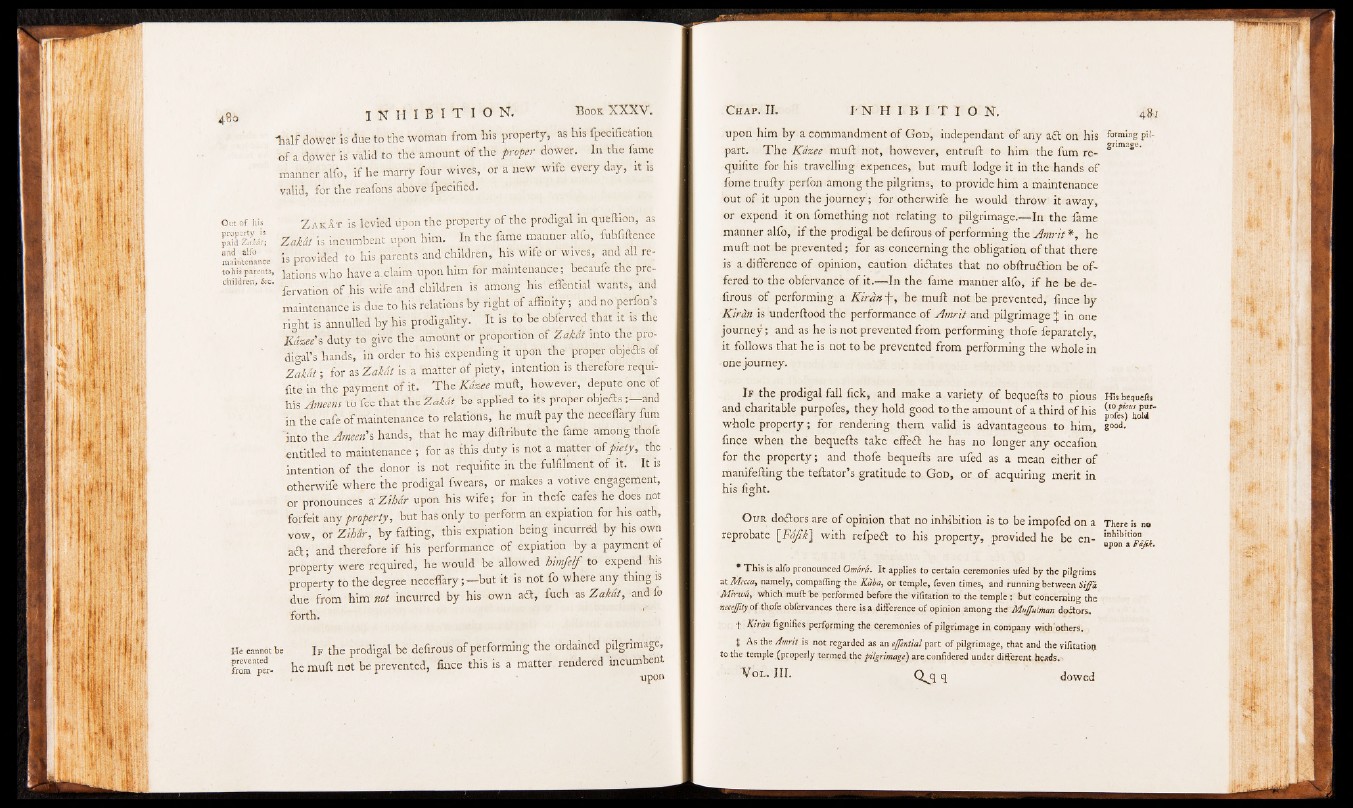
“half dower is due to the woman from his property, as his fpecificAtion
of a dpwer is valid to thé amount of the proper dower. In the fame
manner alio, if he marry four wives, or a new wife every day, it is
valid, for the reafons above fpecified.
Out o f his Z akat is levied upon the property of the prodigal in queftion, as
P d i 'iU Zvkdt is incumbent upon him. In the fame manner alfo, fubfiftence
maintenance is provided to his parents and children, his wife or wives, and all re-
tohis parents, iati0ns who have a. claim upon him for maintenance ; becaufe thé prechildren,
&c. r f h i s w i f e and children is among his effential wants, and
maintenance is due to his relations by right of affinity '; and no perfon’s
right is annulled by his prodigality. It is to be obferved that it is the
Kdzee' s duty to give the amount or proportion of Zakat into the prodigal’s
hands, in order to his expending it upon the proper objedt's of
Zak&t; for as Zak&t is a matter of piety, intention is thereforfe requi-
fite in the payment of it. The Kdzee muft, however, depute one of
his Ameens 'to fee that thcZakdt be applied to its proper objedls;— and
in the cafe of maintenance to relations, he muft pay the neceffary fum
"into the Armen's hands, that he may diftribute the fame among thofe
entitled to maintenance; for as this duty is not a matter o i piety, the
intention of the donor, is hot requifite in the fulfilment o f it. It is
otherwife where the prodigal fwears, or makes a votive engagement,
or pronounces a■ Zihdr upon his wife; for in thefe cafes he dobs not
forfeit any property, but has only to perform an expiation for his oath,
vow, or Zihdr, by failing, this‘expiation being incurréd by his own
a ft ; and therefore if his performance of expiation by a payment of
property were required, he would be allowed himfelf to expend his
property to the degree neceffary;— but it is not fo where any thing is
due from him not incurred by his own adt, fuch as Zakat, and fo
forth.
He cannot be If the prodigal be defirous of performing the ordained pilgrimage,
from "per- he muft not be prevented, f in c e this is a matter rendered in c u m b e n t
. • upon
upon him by a commandment of God, independant of any adl on his
part. The Kdzee. muft not, however, entruft to him the fum requifite
for his travelling expences, but muft lodge it in the hands of
fome trufty perfon among the pilgrims, to provide him a maintenance
out of it upon the journey ; for otherwife he would throw it away,
or expend it on fomething not relating to pilgrimage.—In the fame
manner alfo, if the prodigal be defirous of performing the Amrit * , he
muft not be prevented ; for as concerning the obligation of that there
is a difference of opinion, caution dictates that no obftrudtion be offered
to the obfervancè of it.—In the fame manner alfo, if he be defirous
of performing a Kiràn -f-, he muft not be prevented, fince by
Kiràn is underftood the performance of Amrit and pilgrimage J in one
journey ; and as he is not prevented from performing thofe feparately,
it follows that he is not to be prevented from performing the whole in
onejourney.
I f the prodigal fall lick, and make a variety of bequefts to pious
and charitable purpofes, they hold good to the amount of a third of his
whole property ; for rendering them valid is advantageous to him,
fince when the bequefts take effedt he has no longer any occafion
for the property ; and thofe bequefts are ufed as a mean either of
manifefting the teftator’s gratitude to God, or of acquiring merit in
his fight.
Our dodtors are of opinion that no inhibition is to be impofed on a
reprobate \FajiK\ with relpedt to his property, provided he be en-
* T h is is alfo pronounced Omârâ. I t applies to certain ceremonies ufed by the pilgrims
at Mecca, namely, compaffing the Kaba, or temple, feven times, and running between Siffa
M irw â, which muft be performed before the vifltation to the temple : but concerning the
nccejpfy o f thofe obfervances there is a difference o f opinion among th e MuJJulman dodtors.
t Kiràn lignifiés performing the ceremonies o f pilgrimage in company with "others,
■ t As the Amrit is not regarded as an ejfcntial part o f pilgrimage, that and the vifltation
to the temple (properly termed the pilgrimage j are confidered under different heads. -
VO L . III. Q j j q
forming pilgrimage.
His bequefts
(to pious purpofes)
bold
good.
There is no
inhibition
upon a F àfik .
dowed